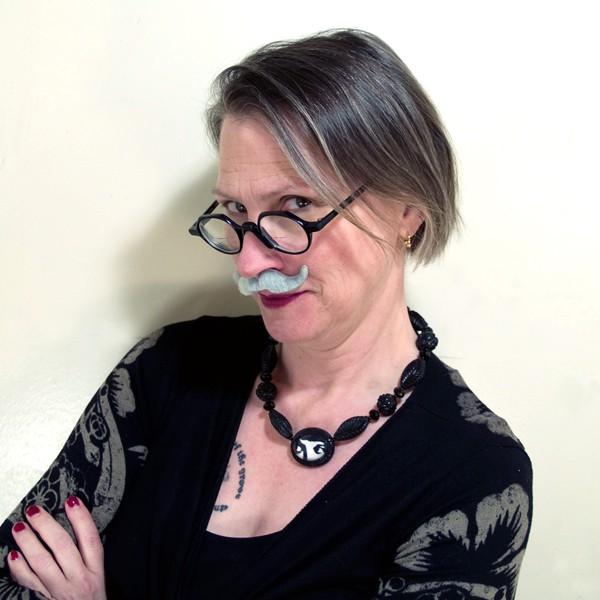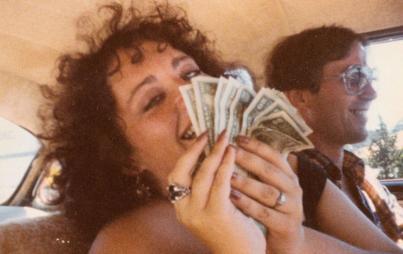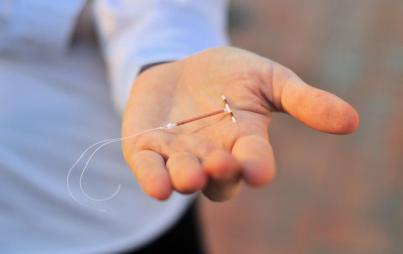
It’s one thing to promote sex positivity, it’s quite another to dedicate your life to the cause. Carol Queen has done just that. The multi-tasking sexologist has been a key figure in San Francisco’s sex positive feminism movement and a prominent advocate for sexual freedom and acceptance.
Her accomplishments are varied and plentiful. She’s the founder and director of The Center for Sex & Culture in San Francisco; staff sexologist at premier sex toy (and sex education) emporium Good Vibrations; curator of Good Vibes’ Antique Vibrator Museum and a prolific writer whose work expands numerous genres, from “explicit fiction” to essays, commentary, book and film reviews and reportage and interviews. She’s even coined a new word (see below for more on “pomosexuality”).
Queen recently shared her thoughts on the anti-slut-shaming movement, the intersection of Wicca and sexuality and the power of quality erotica to excite and inspire—and much more!
Keep up with Queen’s many exploits at her personal site, follow her on Twitter (@CarolQueen) and check out her writing at the Good Vibes Blog.
What inspired you to pursue the field of sexology?
My entire life’s path pointed me in the direction of studying sexuality and being a sex activist. My parents had a difficult relationship, in part because my mother was a survivor of sexual abuse—I did not know that until after my father died, and my mom told my dad about it only at the very end of his life. So, before I knew what sex exactly was, I intuited that it was important, powerful and sometimes problematic.

Why is sex positivity so important to you?
Without it, we live in a barely-challenged sex-negative culture. So many people don’t see the effects of erotophobia [that would be the fear of sex], but if you are sexual at a young age (or even aware of these issues), or sexually different from the norm in some way, cultural sex-negativity is pervasive. We see it in slut-shaming and bullying, enshrined in laws and used by certain religious organizations to divide people. Beyond all this, so many people do not have access to the resources they need to accept themselves, to learn enough about sexuality to have full, happy and safe lives and to find compatible partners. Self-image and life opportunities can suffer. Sex-positive thought is an antidote to at least some of this. I recently wrote a little essay about sex-positivity. I especially recommend it for people who are new to this term—and for those who go around bragging about how sex-positive they are
As the woman who popularized the word "pomosexual," how do you feel about others defining their sexuality with terms like "gay," "bi" and "straight?"
Oh, I feel fabulous about it, as long as that’s what those people want and how they authentically see themselves. “Pomosexuality” doesn’t ask people to be—or aspire to be—something they’re not. Instead, it asks us to make the cultural space to let people be who they are and in particular not to force people into an artificial binary, sex-and-gender-wise. Of course plenty of people are on either end of a binary identity spectrum. But so many people are not! The word is a contraction of “postmodern” and “sexual"—postmodernism is marked by our recognition of multiple subjectivities. For many of us, sexuality is far more complex than “either/or.” The book PoMoSexuals (which I co-edited) is a collection of personal essays by people who do not fit neatly into binary identities.
Do you think pomosexuality is the way of the future? Is it applicable to everyone (to some degree)?
In the sense that each of us is a sexual individual, not exactly like anybody else, yes. But I don’t really lobby for us to call ourselves that. I do want people to understand that one reason sexuality is so much more complicated than we usually acknowledge is that “gay/hetero/bi”—what we usually call “sexual orientation”—only refers to the gender of the partner/s we desire. It has nothing to do with identifying the erotic things we might actually want to do with them. And there are so many erotic possibilities—they cannot be fit on a binary “either/or” scale.

What advice would you give to a teenager unsure of her/his sexuality?
There’s no hurry to fit into a category—you have plenty of time in your life to experience sexuality and learn what you like and who you are. Learn as much as you can, stay open-minded at least about the choices of others, pay attention to your boundaries (and other people’s), and figure out how to get to a safe place to fledge and explore, if you’re not in one now. (Sometimes that means leaving your small town, as it did in my case.)
You write erotica. How does reading erotica help a person explore sexuality?
Reading erotica allows you to explore sex without even having sex, particularly if you read good erotica—I mean that which is written by a good writer, who can take you into a story or situation. It’s safe, it can be experienced at your own speed and you can stop reading if you get to something that pushes your buttons or you’re not ready to explore now (or ever). Some writers can invest their erotica with a lot of information, too, so you can actually learn rather deep things about sexual experience. Not all erotica (or visual porn) does that, but some can. I like to joke that “I got a doctorate in sexology so I could impart more realistic detail to my smut”—but really, many writers try to bring the reader realistically into the story and the sex. Ace writing teacher Jennifer Cross and I facilitate the monthly Erotic Reading Circle at the Center for Sex & Culture and it is so wonderful to see really good erotica develop. Stay tuned for an anthology of work from the ERC later this year!
You played a key role in the development of the SAR process (Sexual Attitude Restructuring). What benefits do participants receive from this process?
Well, I actually came to the scene at the Institute for Advanced Study of Human Sexuality and San Francisco Sex Information—both of which use SAR—well after SAR was developed in the early 1970s. However, I did work on helping to cook up the Safe Sex SAR, a.k.a. the SHARP (Sexual Health Attitude Restructuring Process, which was developed when I was a grad student at IASHS). SAR has several elements: it includes speakers and panel discussions with people whose identities span the sexual spectrum; informational and sex ed videos; small group discussions where personal disclosure is important and honesty is valued.
People learn a lot about themselves at a SAR and generally become more accepting of others who are different. That’s one reason the word "restructuring" is used—the whole process is intended to challenge people’s biases. It’s also a great teacher of sexual communication skills and many people find themselves opening up to new erotic possibilities since it tends to undermine shame they might be carrying about their own secret desires. I think working with SAR was extremely important for me on my own personal journey and I’m very honored to have had a place at the table working with others. It’s wonderful for individuals and couples, but I believe it is a crucial part of training for helping professionals like therapists and medical practitioners. Those professions often don’t include as much sexuality-related training in teaching curricula as the therapist or doctor winds up needing.
You’re a practicing Wiccan. Does your spiritual path influence your exploration of sexuality?
Oh, yes, in that I am much more inclined to accept spiritual yearnings and feelings—whether in myself or others—when it comes to sex. It gives me more comfort or insight regarding Tantra and other “sacred sexualities,” and it was also a basis for the erotic gatherings that my partner Robert and I hosted for many years, the Queen of Heaven parties. (“Queen of Heaven” was an ancient appellation of the goddess Inanna, long before it was used to describe Mary.) We opened each one with a Wiccan ritual.
What are your thoughts about slut-shaming and the anti-slut-shaming movement that seems to be growing?
This is a remarkable moment. Though slut-shaming and bullying are still putting young women at risk, the movement of people speaking up—from SlutWalk to the UnSlut Project to academic research into slut-shaming—is unprecedented, in my experience. I think the existence of sex-positive feminists, who help deconstruct the very notion of sluttiness as the worst thing a woman could be called, makes a difference. But this is partly an Internet thing; the ‘Net makes it way easier to slut-shame and harass people, but also easier to get the word out, speak up and agitate for change. I’m especially interested at the very recent research that suggests that much slut-shaming is done to women by other women, and that there is a class distinction associated with it. That’s pretty fascinating.
I could say the same for the bullying that young queer men and women (and everybody else) face/s; these experiences are all coming out of the shadows, and not a moment too soon. Bless Dan Savage and the It Gets Better Project, too! Finally, let me just say more strongly something that I already implied: among adults slut-shaming is an issue that must be worked on; among youth, it can be deadly. No one—including parents—should be calling out young people for being too sexually curious, different, queer, etc. This is all part of we humans’ impulse to “other” each other, and when that impulse dovetails with sex-negativity, it is really toxic.
You've got so many projects going at once! Is there anything else that we can look forward to?
I’m working on a couple of big writing projects as well—wish me luck and look for those! Never boring, this sex-positive life.






